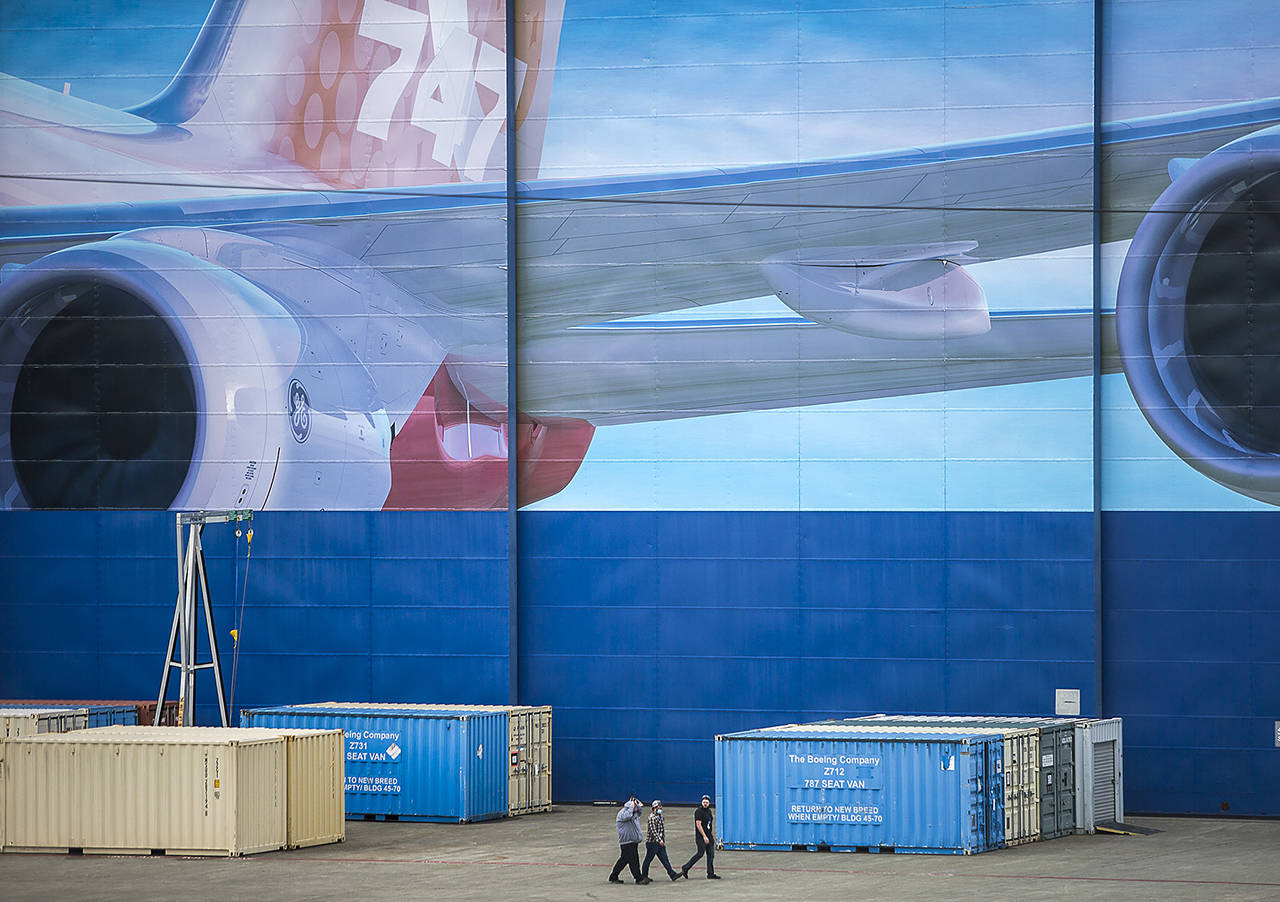By The Herald Editorial Board
The pending agreement to end a 17-year-long trade struggle that pitted the United States against the European Union — with billions of dollars and euros levied in tit-for-tat tariffs over government subsidies for Boeing and Airbus — is welcomed news.
It’s especially good news for a major Snohomish County employer eager for encouraging developments after a year that saw the aircraft giant struggle to get its 737 Max re-certified and back in service after two air disasters, even as it and the rest of the airline industry were hit with the worldwide downturn in air travel forced by the pandemic.
As President Biden seeks to re-normalize relationships with EU and NATO nations that the previous administration had relished in souring, the announced end to the long-running Boeing-Airbus dispute over each government’s subsidies marked an initial and significant step in calming trade tensions and soon ending costly and unproductive tariffs.
But for all involved the return flight to Normal is likely to hit some turbulence, specifically the ebbing government use of tax subsidies to win concessions from corporations and the rise of a major competitor to Boeing and Airbus.
Among those most affected by the trade deal’s wrinkles: Washington state’s own subsidy agreements with Boeing that were offered to win assurances that Boeing planes would continued to be built in the state.
Even before this week’s agreement, Boeing appeared last year to recognize that the trade dispute over its competition with Airbus was no longer in its or anyone’s interest. It went to the state Legislature asking lawmakers to — at least temporarily — suspend a preferential business and occupation tax break that had saved it millions of dollars since 2003 and which was extended in 2013 in a deal to convince it to build the next-generation 777X at its Everett plant.
The Legislature agreed, while also arranging for the eventual resumption of the tax incentive. Two conditions were put on the B&O tax break’s restoration: that the United States and EU would resolve its subsidy dispute before the World Trade Organization, and that Boeing would agree to commit to a specific level of aerospace apprenticeship positions within its workforce.
Given a new opportunity to guarantee greater job assurances in return for that significant subsidy, the concession on apprenticeships seemed a meager win.
“Everyone is fairly equally unhappy,” House Speaker Laurie Jinkins, D-Tacoma, said in March of 2020, as the deal neared eventual approval.
The discontent grew even greater later that fall when Boeing announced that because of a combination of factors, including the pandemic’s near shutdown of air travel, it was consolidating its 787 Dreamliner production in South Carolina and shutting down its 787 lines in Everett, where the innovative composite aircraft was first built. The departure meant the loss of hundreds of jobs in Everett.
“I understand the serious market forces Boeing faces today,” said Gov. Jay Inslee in October. “What I don’t understand is why the company can’t commit to restoring production here when the market for this plane improves.”
Everett’s loss of production of the 787 to a non-union plant in South Carolina should in the future raise doubts in lawmakers’ minds about the certainty of what tax incentives can actually deliver in the long term, at least where world trade is involved.
Yet the eventual agreement between the United States and the EU may resolve any future disputes over subsidies; by preventing them in the first place. Under terms of the proposed deal, according to EU officials cited by Bloomberg reporters, the Airbus-Boeing deal requires that all future development of passenger aircraft be done without government subsidies.
Such a requirement would appear to remove significant leverage from governments in winning concessions from either aircraft manufacturer in the future, but Boeing and Airbus — and their respective nations — may have a larger concern regarding competition, one which appears responsible for helping to break the 17-year impasse: China and its work toward building its own jet airliners.
The Commercial Aircraft Corporation of China (Comac) is building a single-aisle jet, the C919, that is aimed at the markets for Boeing’s 737 Max and Airbus’ A320. The C919 may win its airworthiness certification and make its first commercial flights within the year. Comac has also entered into a deal with Russia’s United Aircraft Corporation to build a wide-body jet, the CR929, designed to compete with Boeing’s 787. The CR929 is expected to make its first flight in 2023 with mass production starting by 2026.
China may not have designs on competing with Boeing or Airbus in the global market, Richard Aboulafia, vice president for the Teal Group aviation consultancy, told The Washington Post.
“China’s plan for aircraft is less about global competition, and more about indigenous substitution: They seem to be preparing for a future where China has de-coupled from the West,” Aboulafia said.
But loss of even a portion of that market remains a concern for Boeing and Airbus, who have been the major suppliers of jets to Chinese and other Asian airlines.
Boeing Chief Executive Dave Calhoun told Bloomberg last week, that as the pandemic recedes, Chinese airlines are expected to account for a quarter of expected growth in jet sales over the next decade.
The subsidies that both Boeing and Airbus have courted over the years — and the damaging and ultimately fruitless tariffs with which their governments retaliated — have provided China time to find its footing as a potential competitor to both jetmakers.
What would have been the result if Boeing and Airbus had skipped the battles over subsidies and just paid their tax bills?
Talk to us
> Give us your news tips.
> Send us a letter to the editor.
> More Herald contact information.

























